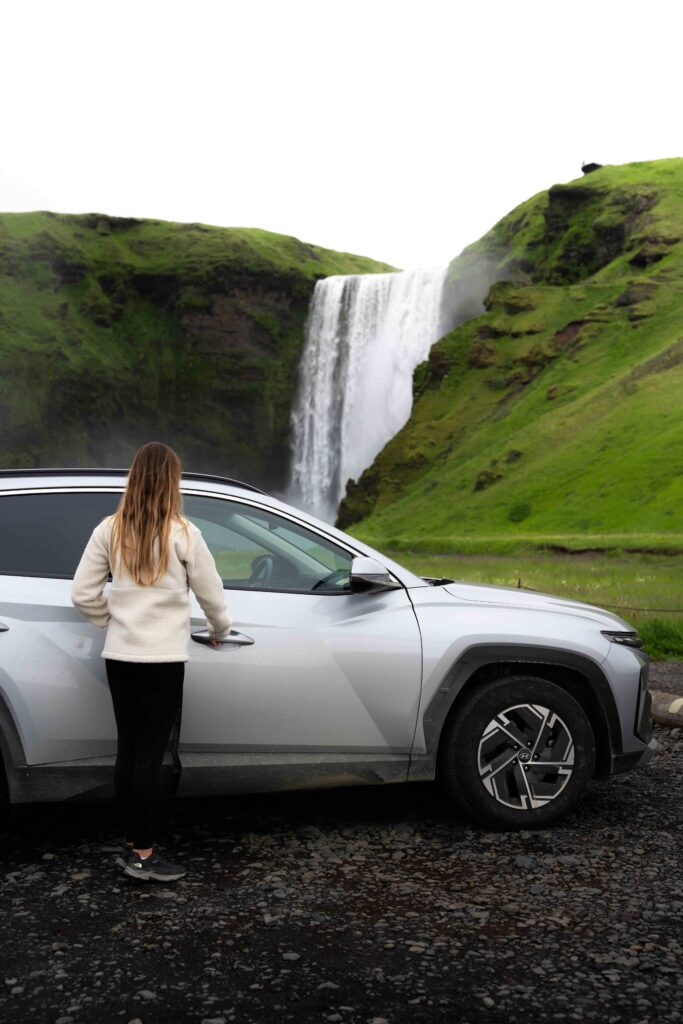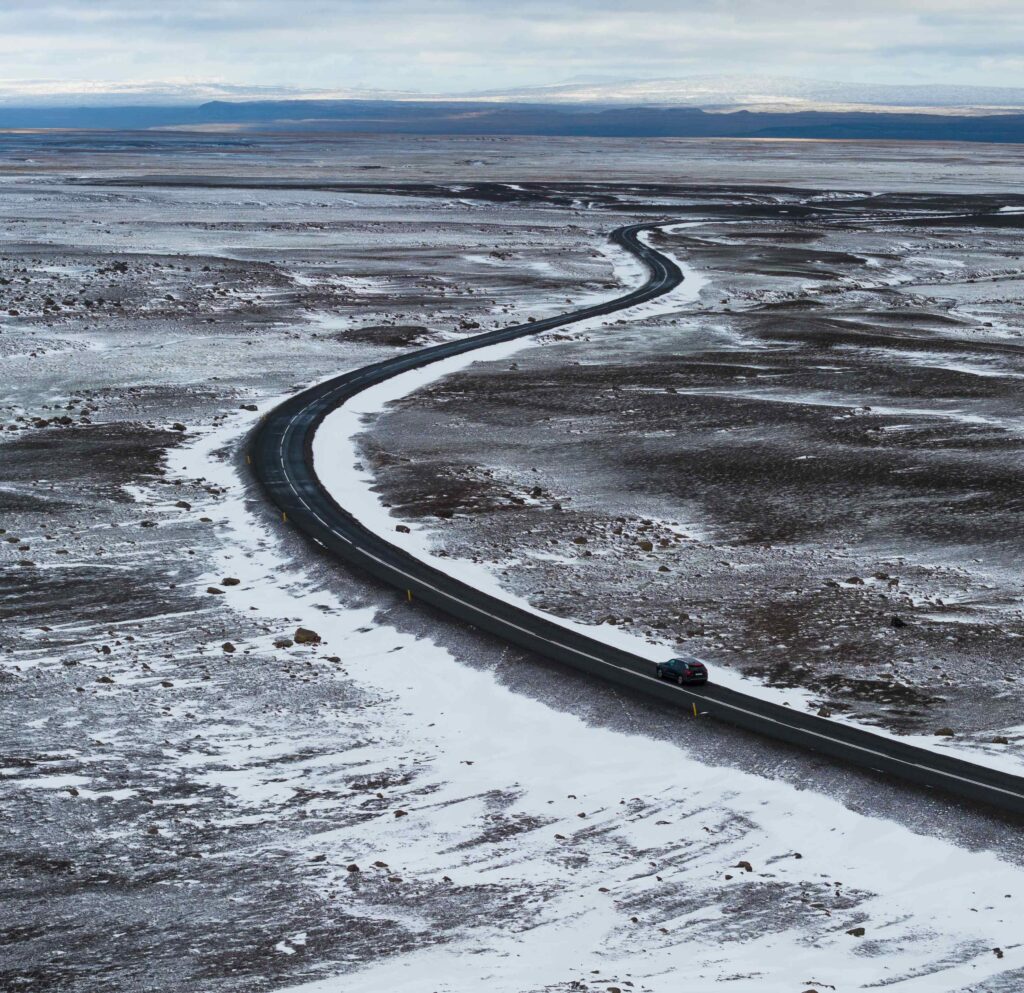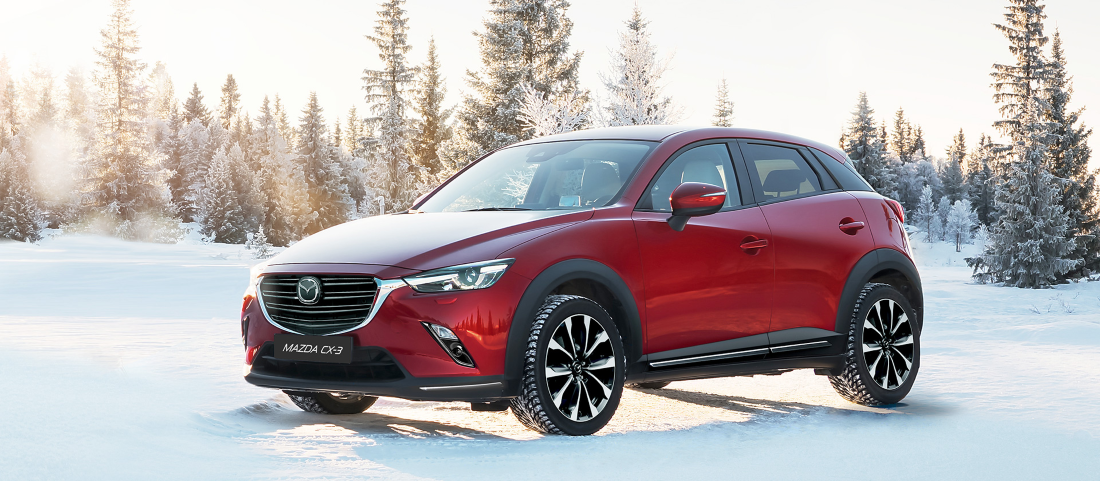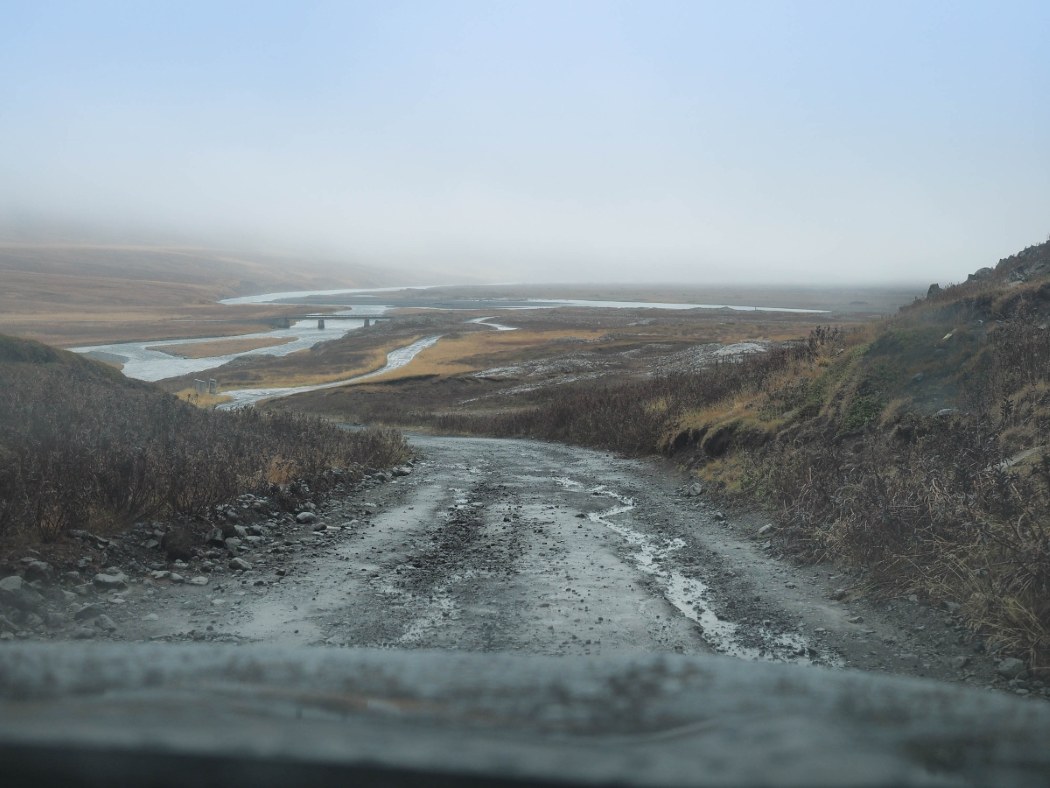Last updated: February 2026
Driving in Iceland is one of the best ways to explore the country’s incredible nature. But it’s important to understand the local rules and road conditions before you start your trip. Here’s a full guide to help you drive safely, avoid common mistakes, and make the most of your Iceland road trip.
Quick Facts: What You Must Know Before Driving in Iceland
- Headlights must be on at all times, even during the day.
- Seatbelts are mandatory for everyone in the car.
- Off-road driving is illegal and heavily fined.
- Use Road.is and Vedur.is to check road and weather conditions before driving.
- Speed limits: 50 km/h in towns, 80 km/h on gravel roads, 90 km/h on paved rural roads.
- F-roads (mountain roads) are open only in summer and require a 4×4.
- Watch for strong wind, loose gravel, and sheep or horses on rural roads.
- Use a car that matches your route — 4×4 for highlands or winter, 2WD is fine for summer ring-road trips.

Driver’s Licence and Age Requirements
To rent and drive a car in Iceland, you must:
- Hold a valid driver’s licence for at least one year.
- Be 20 years old or older (25+ for some vehicle categories).
- Present an International Driving Permit (IDP) if your licence isn’t in Roman characters (e.g. Chinese, Arabic).
- Always carry your licence, passport, and rental agreement in the car.
- If you’re visiting from the EU, UK, USA, or Canada, your national licence is accepted.
Road Types in Iceland
| Road Type | Surface & Condition | Vehicle Type Needed | Speed Limit | Open Season | Recommended Use |
|---|---|---|---|---|---|
| Paved Roads (Ring Road & main routes) | Smooth asphalt, well maintained | 2WD or 4×4 | 90 km/h | All year | General driving around the country |
| Gravel Roads | Loose gravel, uneven in places | 2WD or 4×4 | 80 km/h | All year (some sections closed in winter) | Access to smaller villages, scenic areas |
| F-Roads (Mountain Roads) | Rough, rocky, sometimes with rivers | 4×4 only | 40–70 km/h (varies) | June–September | Highlands, remote nature areas |
Paved Roads (Ring Road & Main Routes)
- Most of Route 1 (the Ring Road) is paved and suitable for all vehicle types.
- However, weather and visibility can change fast — always drive slower than the limit when conditions are poor.
Gravel Roads
- Found mainly in rural areas and national parks.
- Reduce speed before transitioning from paved to gravel to avoid losing control or damaging tyres and windscreen.
- Maintain longer braking distances — gravel roads can be slippery even in dry weather.
- Windscreen protection insurance is highly recommended.
F-Roads (Mountain Roads)
- Designated with the letter “F” before the number (e.g. F35, F26).
- Only open June to September, depending on snow melt.
- 4×4 vehicles only — driving a 2WD here is illegal and voids insurance.
- Roads are narrow, rocky, and may include river crossings.
- Check Road.is before entering; if the road is closed, don’t risk it.
General Driving Rules and Safety Tips
Headlights & Visibility
- Keep headlights on day and night — it’s required by law.
- Use fog lights only in poor visibility.
- Always clear snow or dirt from your lights before driving.
Seatbelts & Safety Seats
- Seatbelts are mandatory for all passengers.
- Children under 135 cm must use an approved car seat.
- Most car rental companies can provide child seats if requested.
Speed Limits
- Urban areas: 50 km/h
- Gravel roads: 80 km/h
- Paved rural roads: 90 km/h
Always adapt speed to conditions — fines for speeding are high and often paid on the spot.
Alcohol & Driving
- Iceland’s alcohol limit is 0.02% BAC, practically zero tolerance.
- Even one drink may result in a fine, licence suspension, or arrest.
Fuel Stations
- Gas stations are self-service and open 24/7 with credit cards.
- In remote areas, stations can be over 100 km apart — fill up whenever possible.
- Diesel and petrol prices vary; see up-to-date rates on Bensinverd.is.
Unique Road Situations in Iceland
One-Lane Bridges
- Slow down and give way to the first vehicle that arrives.
- Cross only when the bridge is completely clear.
Blind Hills and Curves
- Iceland’s roads can rise suddenly. Stay on your side, slow down, and never overtake on blind hills.
Animals on Roads
- Sheep, horses, and birds often wander onto roads.
- Slow down and don’t honk — wait until the road is clear.
- If you hit an animal, notify local police or your rental company immediately.
Gravel to Paved Transitions
- Many roads change surface suddenly. Reduce speed before the transition to avoid losing traction or cracking the windscreen.
Wind & Weather
- Strong crosswinds are common, especially in the south and near open plains.
- Always open car doors with one hand on the handle to avoid wind damage.
- Check real-time conditions on Vedur.is and Road.is before departure.
Winter Driving in Iceland
- Winter brings snow, ice, and limited daylight, especially from November to March.
- Studded winter tyres are mandatory for rentals in this period.
- Avoid driving in storms or blizzards — roads can close quickly.
- Plan shorter travel days (4–5 hours max).
- Watch out for black ice and sudden whiteouts.
- A 4×4 vehicle is strongly recommended for all winter travel.
For more seasonal advice, visit our Winter Driving Guide.

Best Car Types for Different Routes and Seasons
| Travel Type / Route | Best Vehicle Type | Why It’s Recommended | Season |
|---|---|---|---|
| Reykjavik city & nearby attractions | Economy 2WD | Easy to park, fuel-efficient, perfect for short trips | All year |
| Ring Road (Route 1) in summer | Compact SUV or mid-size 2WD | Stable on long drives and occasional gravel | May–September |
| South Coast & Golden Circle | Compact or SUV 2WD | Smooth paved roads with occasional gravel | All year |
| Westfjords & Eastfjords | 4×4 SUV | Roads are narrow, remote, and partly gravel | May–October |
| Highlands (F-roads) | 4×4 only | Required by law; capable of river crossings and rough terrain | June–September |
| Winter travel anywhere | 4×4 with studded tyres | Better control on snow, ice, and wind | November–April |
Off-Road Driving and Fines
Off-road driving is strictly forbidden in Iceland. This includes driving on moss, lava fields, beaches, or anywhere without a marked road.
Fines can exceed 350,000 ISK and may include criminal charges.
Stick to official roads and tracks — Iceland’s fragile nature takes decades to recover from tyre damage.
Electric & Hybrid Car Kilometre Charge (kílómetragjald)
Until now, road maintenance in Iceland has been funded through taxes collected on petrol and diesel.
Because hybrid and electric vehicles use significantly less—or no—fuel, they contribute less to these traditional taxes, even though they rely on the same public roads.
To address this imbalance, authorities have introduced a road usage tax specifically for PHEV and EV vehicles.
What This Means for You
When you rent a hybrid or electric vehicle with us:
• A Road Usage Tax will be added to your rental agreement.
• The charge will be listed as a separate line on your receipt.
Why This Matters
✅ Fair for everyone: All drivers help support Iceland’s road system, regardless of the vehicle type they use.
🌍 Supports sustainability: Ensures continued investment in infrastructure for cleaner, more efficient transportation.
⚙️ Fully compliant: Keeps our operations aligned with updated national road-use regulations.
Emergency Numbers and Road Assistance
- Emergency (police, fire, ambulance): 112
- Road conditions: www.road.is
- Weather forecasts: www.vedur.is
- Thrifty Road Assistance: 24/7 support number on your rental agreement
If you get stuck or have an accident, stay inside your car with hazard lights on until help arrives.
FAQ
- Can I drive in Iceland with my home country licence?
Yes. Licences issued in EU/EEA, USA, Canada, UK, and many other countries are valid. If your licence isn’t in Roman letters, bring an International Driving Permit (IDP).
- Do I need a 4×4 to drive in Iceland?
Not always. A 2WD car works well for summer trips on the Ring Road. You’ll need a 4×4 for winter travel or F-roads in the highlands.
- Are headlights required in daylight?
Yes. Headlights must be on at all times — day or night.
- Can I drive off-road to reach a viewpoint or waterfall?
No. Driving off marked roads or tracks is illegal and carries heavy fines.
- How can I check if roads are open?
Visit Road.is for daily road status and Vedur.is for weather forecasts.
- What should I do if I damage the car on gravel or from wind?
Stay safe, pull over, and call Thrifty’s 24/7 roadside assistance. Report any damage immediately when returning the vehicle.
Before You Go: Final Tips
- Check your route every morning before starting the car.
- Bring snacks and water — shops can be far apart.
- Keep your fuel tank above half at all times.
- Drive slower than you think you need to — Iceland’s scenery isn’t going anywhere.
- When in doubt, stop safely and wait for better weather.
Related Guides
- Winter Driving in Iceland
- F-Roads in Iceland: What You Need to Know
- Choosing the Right Car for Your Iceland Trip
- Iceland Car Insurance Explained

Recommended Read
Visiting Iceland during winter?
Winter driving in Iceland can be different what you are used to. Not used to driving in snow or ice? Read more.

Renting an AWD/4×4 car?
F-roads are mountain roads that are only suitable for AWD/4×4 rental cars.